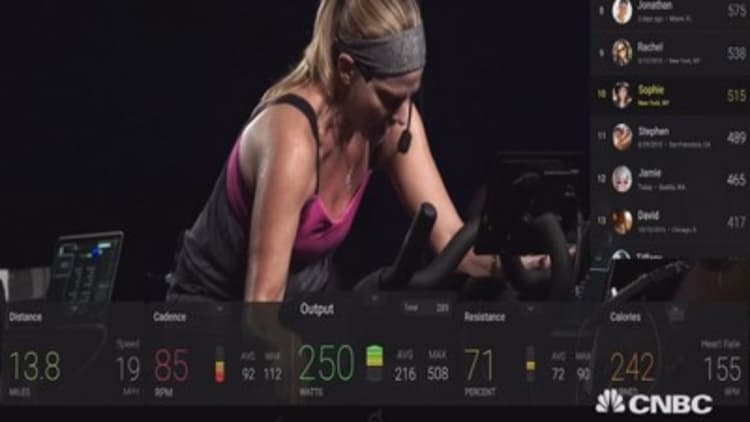
Rather than rubbing sweaty elbows in a cycling class at the gym, a new company is giving the fitness conscious the luxury of doing it in the privacy of their own homes.
Instead of traveling to the gym or a class, Peloton Cycle lets customers purchase stationary bikes and partake in live streaming classes from their houses. These bikes track speed and progress, and lets riders directly compete with others around the world.
With the fitness craze in full swing, the concept is one whose time has come in the eyes of investors. Peloton initially got its start on crowdfunding platform Kickstarter, and has raised more than $100 million last year from Tiger Global, True Ventures and most recently Catterton Partners.
Peloton CEO John Foley told CNBC his objective is to give back people their time as they attempt to reach their fitness goals. "For the young mother, who is 40 years old, who has a 3-year-old napping in the next room, we're allowing her to take a high energy cycling class without getting a babysitter, and without the travel time."
Read MoreHigh end cycling chain SoulCycle files to go public
The stationary bike craze has exploded recently, amid what Allied Market Research noted last year is set to become a nearly $12 billion market for fitness equipment. SoulCycle, the high-end cycling boutique which offers classes starting at $34 per class, has opened 55 locations, announced plans to go public, and most recently teamed up with Target to sell branded gear.
'Rooting' for the competition
With many consumers opting for the in-studio cycling experience, Peloton's ability to peel them away from those classes remains to be seen. Foley, however, doesn't see them as competition.
"We are compared to Soul Cycle and Fly Wheel and some of the boutique fitness classes, but we actually love their success," Foley told CNBC. "We are rooting for the success and potential IPO of SoulCycle."
Foley said his target users are different, saying people in their twenties and early thirties have more time to go to the gym, and to boutique cycling classes. Peloton's target demographic, however, is 35 to 65 year old. "These are people who have children, live in suburbs, have nice homes, they have the money and space but don't necessarily have time," Foley said.
Either way, Peloton sees the health craze riding in its direction. "We're seeing Americans becoming healthier and healthier," the CEO said.
Americans are increasingly interested in fitness. Currently, more companies are launching fitness courses and competitions such as Barry's Bootcamp, FlyWheel and extreme fitness platforms like Tough Mudder. The competitive landscape means Peloton may have its work cut out for it to draw in new clients. Foley, however, didn't seem fazed.
"There's a bunch of young companies that are doing fantastic stuff, that are all going to do well riding this fitness boom," he said.


